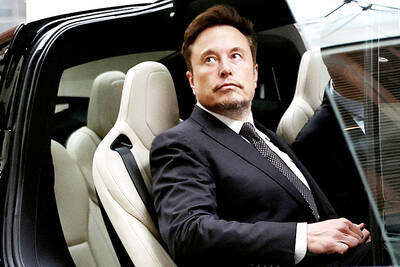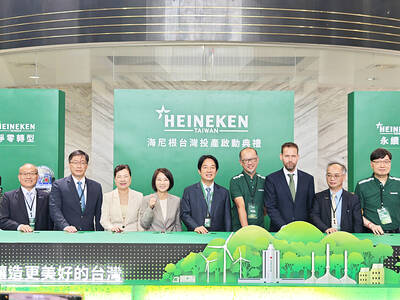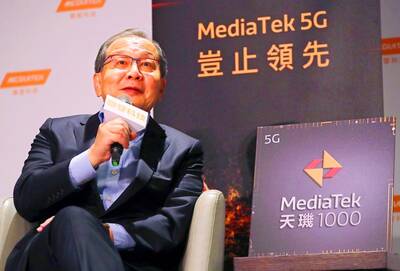The London Metal Exchange (LME) faces a lawsuit brought by campaigners on Thursday over the trading of “dirty metals,” whose mining they claim sparks environmental disasters in Indonesia.
The LME denies the allegations.
London Mining Network, comprising green and human rights campaigners, is filing the “landmark” legal action at the High Court along with NGO grouping Global Legal Action Network, a statement said.

Photo: Reuters
The pair “argue that, by enabling the global sale of ‘dirty metals,’ the exchange is in breach of UK anti-money laundering and proceeds of crime legislation.”
“If successful, this case will force the LME to revisit the rules under which it lists metal for trading on its exchange, the statement said.
“This in turn will force metal producers to adapt their mining practices if they want to keep being able to access this platform which is essential for them to reach customers and to sell their products,” it said.
The lawsuit highlights the LME’s trade in metals from the Grasberg mine in Papua, eastern Indonesia, which has had “environmentally devastating” consequences and harmed “indigenous communities.”
West Papuan community leader Adolfina Kuum said the “case is about our fight against those who profit from the destruction of our people’s rivers, our forests and way of life. Our communities are experiencing the life-threatening effects of mining, we have no choice but to take up this fight because if we remain silent who will speak for us?”
The lawsuit said forests and rivers were disappearing as a result of mining of “dirty metals.”
It said “sedimentation resulting from toxic mining waste is causing widespread health problems for the community,” and that heavy metal pollution was causing “skin diseases and other health conditions” in the community.
The global mining industry faces regular criticism over its environmental and social impact.
“The environmental harms in West Papua highlighted in this case are symptomatic of a deeper systemic problem across the world,” the statement said.
Global Legal Action Network said it has “identified similar problematic patterns with mining corporations operating in Brazil, Peru, Guinea and the Russian Federation to name only a few.”
The LME said that it would rebut what it describes as a “misconceived” lawsuit.
“Over and above its existing regulatory requirements, the LME’s brand-listing requirements reflect the international consensus on best practice in respect of ethical and sustainability issues,” it said.
The exchange added that it has “undertaken extensive discussion” with the industry regarding the inclusion of “further environmental requirements” in its listing regulations.

Huawei Technologies Co’s (華為) latest smartphones carry a version of the advanced made-in-China processor it revealed last year, results from an independent analysis showed. This underscored the Chinese company’s ability to sustain production of the controversial chip. The Pura 70 series unveiled last week sports the Kirin 9010 processor, research firm TechInsights found during a teardown of the device. This is a newer version of the Kirin 9000s, made by Semiconductor Manufacturing International Corp (SMIC, 中芯) for the Mate 60 Pro, which had alarmed officials in Washington who thought a 7-nanometer chip was beyond China’s capabilities. Huawei has enjoyed a resurgence since

purpose: Tesla’s CEO sought to meet senior Chinese officials to discuss the rollout of its ‘full self-driving’ software in China and approval to transfer data they had collected Tesla Inc CEO Elon Musk arrived in Beijing yesterday on an unannounced visit, where he is expected to meet senior officials to discuss the rollout of "full self-driving" (FSD) software and permission to transfer data overseas, according to a person with knowledge of the matter. Chinese state media reported that he met Premier Li Qiang (李強) in Beijing, during which Li told Musk that Tesla's development in China could be regarded as a successful example of US-China economic and trade cooperation. Musk confirmed his meeting with the premier yesterday with a post on social media platform X. "Honored to meet with Premier Li

Dutch brewing company Heineken NV on Friday announced an investment of NT$13.5 billion (US$414.62 million) over the next five years in Taiwan. The first multinational brewing company to operate in Taiwan, Heineken made the statement at a ceremony held at its brewery in Pingtung County. It also outlined its efforts to make the brewery “net zero” by 2030. Heineken has been in the Taiwanese market for 20 years, Heineken Taiwan managing director Jeff Wu (吳建甫) said. With strong support from local consumers, the Dutch brewery decided to transition from sales to manufacturing in the country, Wu said. Heineken assumed majority ownership and management rights

GROWTH DRIVERS: The firm expects to benefit from generative AI applications for smartphones, higher average selling price of flagship chips and market share gains Smartphone chip designer MediaTek Inc (聯發科) yesterday said it estimates that revenue would expand at an annual rate of about 15 percent this year, as a proliferation of generative artificial intelligence (AI) applications for premium smartphones are fueling demand for its flagship smartphone chips. It expects its smartphone chip revenue to outgrow the company’s average growth rate this year, benefiting primarily from the higher average selling price of its flagship smartphone chips and market share gains. The flagship chip revenue is to soar 50 percent year-on-year this year, MediaTek told an investor conference yesterday. As a whole, this year’s gross margin is